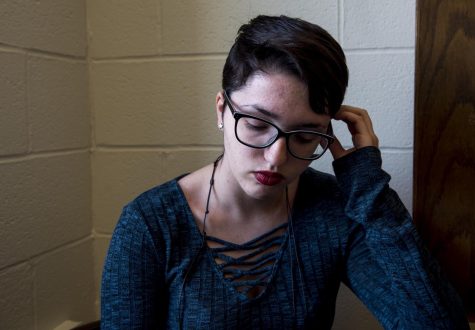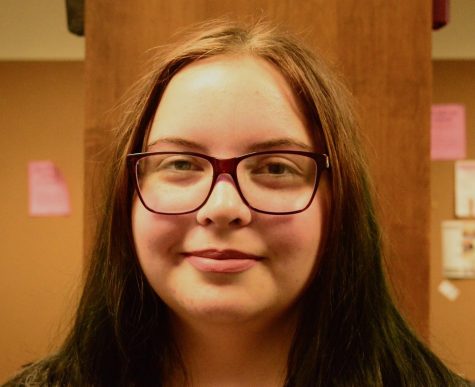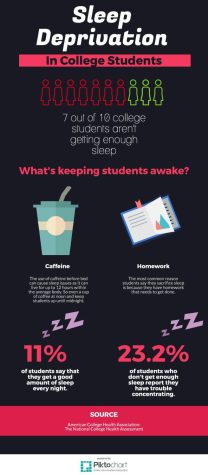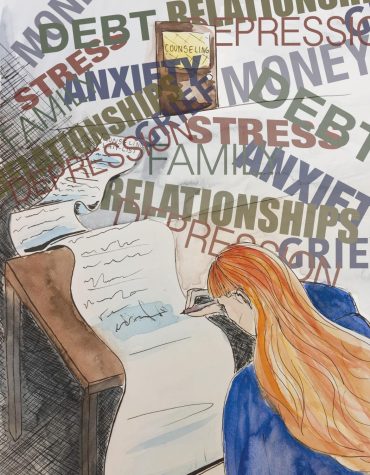After the election, Trump-induced anxiety lingers
Republican presidential nominee Donald Trump speaks to supporters during his rally at James A. Rhodes Arena in Akron, Ohio on Monday, Aug. 22, 2016.
April 30, 2017
On the night of the election last November, Kent State junior political science major Haley Foster went to sleep before the results were broadcast across the nation, with the states on the map turning blue or red as the votes were counted.
Foster assumed she would wake up to the election of the nation’s first female president.
“I went to class dressed in all black — like, full mourning,” said Foster, the newly elected director of Academic Affairs for Undergraduate Student Government. “This sounds dramatic, reflecting on it, but it was just like this intense sadness, where I couldn’t breathe. I didn’t know how to process it. I wasn’t really sure where our country was going.”
This “intense sadness” is something that more and more Americans are recognizing as a byproduct of the recent presidential election and the Trump presidency — a CareDash survey found that 59 percent of those polled were “somewhat anxious” over election results.
“I feel like in past presidencies, although there have been things that have been kind of shocking, and that kind of stuff, it’s not something every other day,” Foster said.
Feeling useless
In an article written in Psychology Today, this anxiety was called a “new societal angst” and the effects, among those who are devoted to politics, have been intense.
“The moment he was elected, I felt an impending sense of doom and anxiety. I know the culture his presidency will see, I’ve already began to see it before he was elected,” said sophomore theater studies major Rue Monroe. “With having bipolar (disorder), I already have manic-depressive episodes. But with the intersectionality of my identities, I felt hopeless and lost. I felt myself, the first couple days, slip into a deeper depression.”
Monroe identifies as bigender, and said they noticed the same reaction among those in their community — Monroe is the president of Kent State Unite for Reproductive & Gender Equity on campus.
“In my organization, I knew my members felt the same way, most of them are AFAB (assigned female at birth) and even more of them identify as LGBTQ+ and have mental illnesses,” Monroe said. “We knew our rights could be taken away at any moment, and again, felt useless.”
Initial disbelief
Junior psychology major Mara Cash thought that watching the election results would be a “fun little get together” with her friends.
Instead, Cash said she cried through the night.
“I wasn’t crying because I felt like I had lost a race, or I felt like I had lost time campaigning for this candidate,” Cash said. “I was crying because I was really afraid that sexual assault was going to increase on campus, and I was really thinking about all the people and all the men on campus who were going to feel maybe just a little bit more empowered to act the way that Trump does or say the things that Trump does.”
Cash is a sexual assault survivor and the president of Kent State’s Club for Feminists.
“Knowing that I’m around people who could potentially have voted for someone who is a sexual predator — who has admitted to sexually assaulting multiple women — that’s a major source of anxiety for me, just in everyday interactions,” Cash said.
In fact, according to a report released by CNN, crisis line and suicide support line calls surged in the time following the election, with the National Suicide Prevention Hotline seeing a volume of calls “two to three times what it had been.”
Bill Russell, the chief officer at Portage Behavioral Health at Coleman, said that from an observational perspective, this increase was real.
“I know that there was an increased need for support from those who were already involved with us — I believe some increase in crisis calls or support calls,” Russell said.
Reactions
In addition, there was also an increase in general need of support from the community.
“I know that we had some influx of people asking for more support, people who are already in our services — you know, identifying more stress, identifying more anxiety, many people in fear of losing their benefits,” Russell said.
This loss of benefits — which would come with the proposed dismantling of the Affordable Care Act, according to Russell — is another source of panic from the political landscape, and an even more concrete cause for worry.
“People who come to us, they’re receiving a healthcare service. So there’s a diagnosis (and) there’s some type of condition that’s involved,” Russell said. “But the breadth of services we provide — there’s a great deal of psychosocial support, advocacy in the community … and the vast majority of people who are in case management as a service are people who are dependent heavily on those benefits and resources.”
The Affordable Care Act expanded MedicAid coverage to a wider group of people — beyond what Karyn Hall, director of Community Relations at the Mental Health & Recovery Board of Portage County, described as “a woman with children.”
“Once they opened it up and expanded Medicaid to cover more people, we have been able to expand our services and more people have been able to get the care they need, in mental health and addiction,” Hall said.
The anxiety surrounding the presidency seeps into more tangible issues than health care alone.
“I’m witnessing bills that are attacking funding for Planned Parenthood, I’m witnessing protections for the LGBTQ community being stripped away — kind of all of the socioeconomic things I care about are being attacked,” said self-described activist Madison Newingham.
Newingham, a sophomore political science major and the new director of student involvement for USG, said she believed the anxiety affected those who were politically active within the progressive sector.
“It just kind of sucks right now, to be honest,” Newingham said. “It’s pretty disheartening to see, as a progressive, every branch of the government completely red.”
Ebbing activism
On Kent State’s campus, this stress and anxiety was, at first, a boon for activists and those looking to “defy” — such as Cash’s student organization. Just after the election, attendance to her organization spiked.
“And it was people who were really angry and really wanted to make a change,” Cash said. “I feel like that, as time has progressed, and (Trump) has continued to come out with these devastating executive orders, I feel like people have kind of given up, and their anxiety has overwhelmed them.”
This initial outpouring of emotion was part of the incentive for the Trump-themed KentTALKS event “Let’s Talk Trump,” which has been held twice so far on campus — with more than 150 students attending the most recent event.
“For some people, just being able to express their feelings in an open forum is helpful,” said Jennifer Kulics, associate vice president in student affairs. “Our hope is also that hearing different perspectives on trending topics might help students understand opposing viewpoints and deliberate respectfully.”
Michael Daniels, program coordinator at the Student Multicultural Center and co-moderator and facilitator of the event, said that there was a need for an official university platform to express what they had been expressing through protests and demonstrations on campus.
“These are very serious issues,” Daniels said. “There’s been a lot of changes that I think breeds a lot of anxiety, especially with the group of students.”
Daniels said that the immediate reaction following the election, as well as continuing through the presidency, is and was a sort of despondency.
“There is a lot of outpouring of just angst after the election, the inauguration and then leading up to some of the decisions,” he said.
Lingering anxieties
Directly after the election, Black United Students held an emergency meeting. Daniels, as well as others in the center, “took notes” to decide how to best help the students through the resulting anxiety.
“People are affected by decisions, period. In addition to that, I don’t think that people are thinking about people’s anxiety and worry and nervousness and remorse — whatever it may be, I don’t think that they’re thinking about it in the right ways,” Daniels said.
He emphasized the fact that the administration is still newly underway.
“We still have four years of administration — so that’s four years of people’s lives can be affected,” Daniels said. “That’s more what people are possibly worried about — things changing in the next four years that they’re used to. And it not being for their benefit, it being for their detriment.
“It’s not something to get over until it is over,” Daniels said.
Editor’s note: This story is part of a student media project entitled “The Silent Struggle.” See the whole project here.
Cameron Gorman is a senior reporter, contact her at [email protected].
























